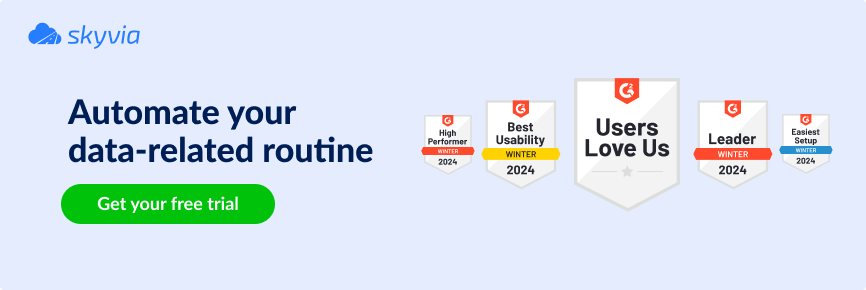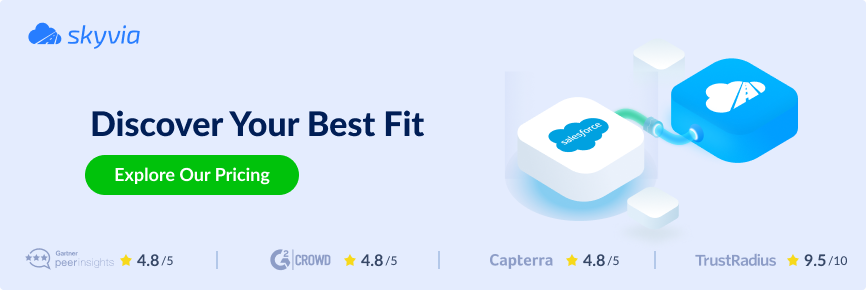One of the emerging professions in the IT market today is the role of Salesforce business analyst. This is natural since Salesforce is the most popular CRM nowadays, thanks to its multiple benefits. Its mobile-first CRM app, embedded AI, outstanding customization opportunities, etc., help businesses boost sales by up to 39%.
A Salesforce business analyst is responsible for administering the system and appropriately managing business requirements for customization. If you want to embark on a journey as a Salesforce business analyst, this article will help you discover the responsibilities and skills typical for this role. It also provides hints on how to start and develop your career as a Salesforce BA.
Table of Contents
- Who is a Salesforce Business Analyst
- Responsibilities of a Salesforce Business Analyst
- Getting Started with a Salesforce Business Analyst Career
- Development Opportunities for Salesforce Business Analysts
- How Skyvia Supports Salesforce Business Analysts
- Conclusion
Who is a Salesforce Business Analyst
A Salesforce business analyst is undoubtedly a key player in any team. This specialist gathers business requirements for adapting CRM to the company’s demands by customizing the Salesforce components and translating them into clear language for technical specialists. It’s like an interpreter helping people speaking different languages to understand each other, and the quality of such translation determines the success of the Salesforce feature implementation.
Let’s look at the basic case when sales executives need to prevent the creation of duplicate leads in the system. A Salesforce business analyst must ensure data quality by implementing one-time data cleansing and establishing rules that exclude duplicate creation in the CRM. A Salesforce business analyst can address this problem by relying on Salesforce’s built-in functionality for duplicate record management. Otherwise, they might develop other solutions to attain the desired objective.
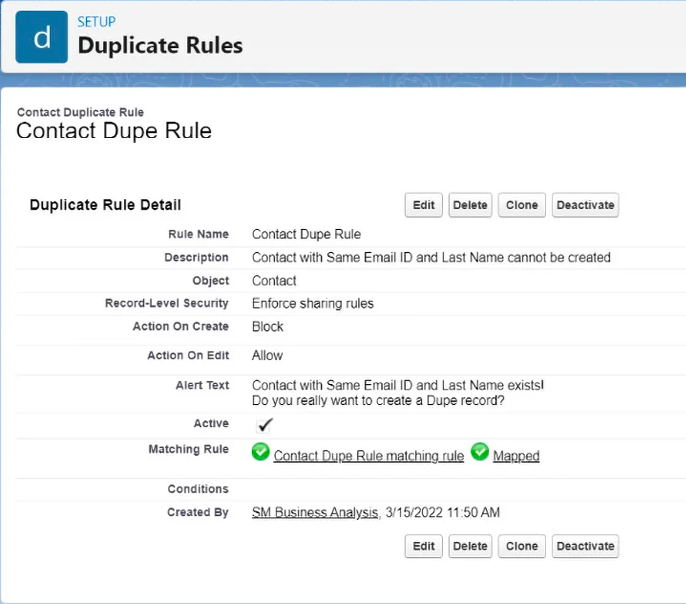
Responsibilities of a Salesforce Business Analyst
Now, let’s focus on Salesforce business analysts’ responsibilities and tasks.
- Elicitation. This core responsibility includes techniques for collaborating with stakeholders and requirements gathering.
- Process mapping. The information collected from stakeholders needs to be correctly organized. A Salesforce business analyst creates process maps with clear details and instructions that facilitate feature development and testing.
- User stories. A Salesforce BA creates user stories in task-tracking systems, such as Jira. These stories are statements with a structure like “As a [role], I want to [action] so that I can obtain [outcome].” They are necessary to validate development work, especially during user acceptance testing (UAT).
- Documentation. A Salesforce BA’s regular task is to create internal and external documentation by adding text, diagrams, tables, and other elements. Updating and enhancing the existing documentation is also very important.
- Testing new features. Sometimes, a Salesforce BA assists the quality assurance and programmers team in testing new functionality. This is necessary to ensure the implemented features meet the initial business requirements.
- Demo sessions. Once the needed functionality is implemented and tested in Salesforce, a BA makes user presentations and demo sessions.
- Reporting and analysis. A Salesforce BA must craft reports indicating the time spent on feature implementation, documented processes, etc.
In big companies, Salesforce business analyst usually collaborates with Salesforce data analysts and Salesforce test analysts. In such cases, the test analysts handle the quality assurance of the new features and are responsible for demo sessions. Meanwhile, Salesforce data analysts are occupied with all the reporting and analysis.
Getting Started with a Salesforce Business Analyst Career
To start your professional journey as a Salesforce business analyst, you must develop skills and gain the knowledge essential for this role. Those are crucial for making the first steps in this role.
Soft skills
- Communication. Strong communication and collaboration skills are necessary to obtain as much information as possible from the feature requesters.
- Analytical thinking. This ability is crucial as it allows specialists to decompose complex processes into simple tasks.
- Business vision. This skill ensures the requested Salesforce features align with business objectives.
- Teamwork. As a Salesforce BA collaborates with different teams and stakeholders, strong teamwork experience and management skills are necessary for process coordination and conflict resolution.
- Time management. This skill helps to schedule personal tasks and those of team members on the project.
Technical skills
- Salesforce administration. A Salesforce BA must understand the platform well, including administration, architecture, data model, and security features. Knowledge about Sales Cloud, Service Cloud, Marketing Cloud, and Commerce Cloud is also highly appreciated.
- Task management and tracking tools. A Salesforce business analyst must use task-tracking tools like Jira and Monday.com to create and manage tasks.
- Business intelligence (BI) tools. Familiarity with Microsoft Power BI, SAP, and other similar tools is necessary for data gathering and analysis,
- Spreadsheet tools. Experience with tools like Google Spreadsheets and Excel is essential for data analysis and interpretation.
Knowledge
- Process modeling. Understanding the BPMN (Business Process Model Notation) technique helps a Salesforce BA model processes.
- System analysis. It’s crucial for daily operations to know how to create UML diagrams, use cases, and documentation.
- Programming languages. Apex is the necessary language for Salesforce management and customization. Knowledge of Python and SQL for data querying and analysis, respectively, would be a great plus.
- Agile methodology. Understanding Scrum and Kanban agile approaches are necessary for building effective teamwork.
Finally, to become a Salesforce business analyst and work in prestigious organizations, you must pass the certification exam first. This exam consists of multiple questions to assess your knowledge, skills, and experience associated with a Salesforce BA role. You can prepare for the certification exam independently or proceed with Salesforce’s official online preparation courses.
Development Opportunities for Salesforce Business Analysts
As mentioned above, the Salesforce BA role has several branches: data analyst, test analyst, quality assurance specialist, etc. So, one possible career development opportunity is to select a narrow specialization in a Salesforce-related field. Note that such opportunities are usually available in big companies and enterprises.
The other way is to climb the career ladder as a Salesforce business analyst. Starting from a junior position, you can advance your experience and take additional certification courses to become a middle or senior-level professional.
What’s more, a Salesforce business analyst position can be a good starting point for those eager to develop their career paths in the IT industry. You may consider becoming a developer or project manager in the future.
How Skyvia Supports Salesforce Business Analysts
As a Salesforce business analyst, you’ll have to manage much data originating from sources other than CRM. Thus, expanding the standard toolkit of BI and PM tools with solutions for data management and integration is necessary.
One such tool for working with data is Skyvia – a universal cloud application designed for various data-related procedures. In particular, Salesforce Data Loader by Skyvia is suitable for the following:
- Importing data from other applications and databases to Salesforce and for CRM data enrichment against third-party datasets.
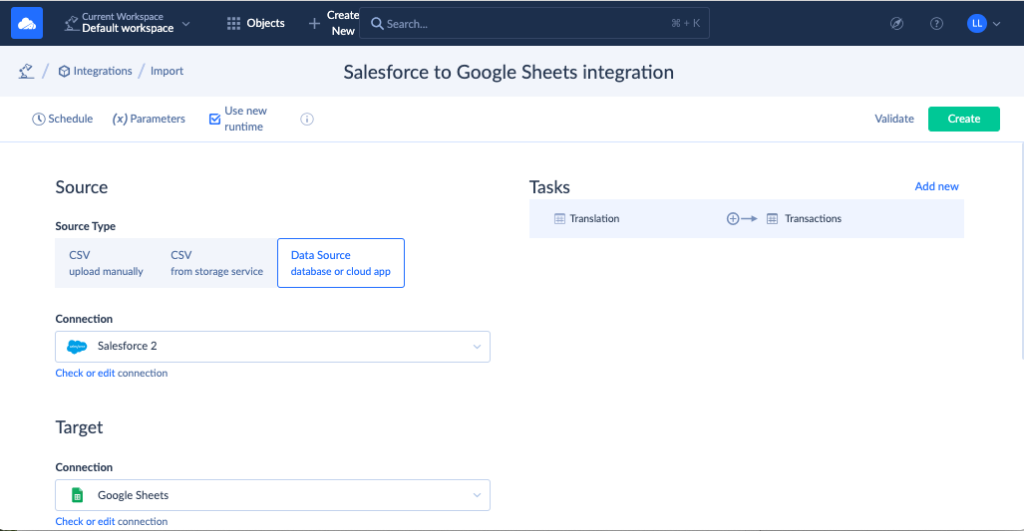
- Exporting Salesforce data into a CSV file and saving it locally or on cloud storage could be an option for backing up your Salesforce data regularly.
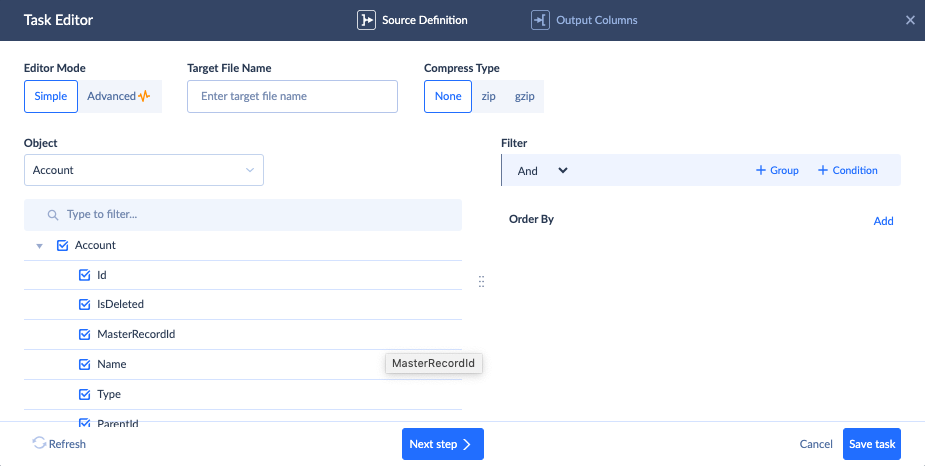
Skyvia Data Integration also allows users to import and export their Salesforce data along with some other operations, such as:
- Synchronizing data between two Salesforce accounts and between Salesforce and another system.
- Replicating Salesforce data to the selected data warehouse with the automatic table schema creation and incremental updates.
Working with Skyvia is convenient as it requires no coding skills and can be accessed directly via a web browser.
What’s more, Skyvia has a fully functional free version that could work for simple integrations, but it also offers sophisticated functionality under the paid plans. Feel free to check them out and select the one that suits you best!
Here are some examples of how Skyvia helps Salesforce business analysts implement the needed workflows related to Salesforce.
Salesforce to Salesforce integration Workflow
If your enterprise has recently acquired another company, you might want to merge the Salesforce accounts of both entities. Anyway, if there are any other reasons for integrating Salesforce accounts, feel free to check the detailed instructions in the video.
Case Study on Salesforce and QuickBooks Integration
If there is a need to aggregate all the financial data in the accounting tool, which is a central financial hub of a company, the integration needs to take place. In the video below, see the case study where Skyvia’s clients have successfully implemented the financial data flow from Salesforce to QuickBooks.
Conclusion
Salesforce business analysts are multitasking professionals who must be flexible, communicative, and precise. They must also possess strong analytical and time management skills, business vision, and proficiency in teamwork management.
A Salesforce BA usually gathers requirements for the requested functionality, collaborates with stakeholders, handles documentation, tests new features, and performs analysis. BI tools, PM services, spreadsheets, and data integration tools, such as Skyvia, assist those professionals daily.
